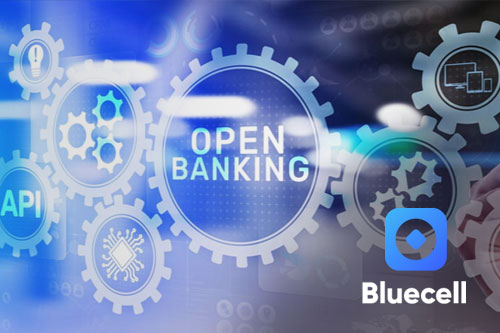Open Banking - Redefining the Financial Landscape

Open Banking is a fairly new concept. With the progress in the field of technology, it is picking up by establishing new ways of working and bringing in efficiency.
What is Open Banking?
Open banking is a system under which banks share their application programming interfaces (APIs), that enables third party developers to access financial information needed to develop new apps and services. It is a financial service to provide account holders greater financial transparency options.
Open Banking is gaining acceptance in many growing economies and spreading knowledge to make consumers understand how it can bring about innovative changes.
It presents a summary of an entity's entire financial history, for instance some apps for open banking are budget planning programs, which pull data from an individuals bank accounts and credit cards to provide solutions.
How does Open Banking work
Open banking will share the financial information electronically, securely, and only when customers approve of sharing the data. It opens up the way to new products and offers that could help customers and small to medium-sized businesses get better financial services. It will make the process of verifications and authentications faster that are required for many approvals. It will reduce the documentation and paperwork to great extent.
Customers can access new financial services and products from regulated third party providers. Banks will grant access to third parties through the APIs to their bank account data, to either collect information or make payments.
It works with online or mobile banking through digital platforms. It puts pressure on banks to improve their customer service as many new entrants are joining the market with improved and transparent competitive pricing for many products. Some of the other services provided are:
User Friendly Apps and Tools
App developers will introduce new user friendly apps with open APIs, allowing them to help you take control of your financial transactions. With artificial intelligence, these tools can recommend financial planning and appropriate products suitable for you.
Financing & Business Loans
Approvals for loans or refinancing can become easier. Instead of manually gathering information from many sources and submitting it to the banks, consumers can allow lenders to get their financial information from APIs for verification of their credit history to get approvals and best offers.
Automated Accounting
All your data will be consolidated in one place. Businesses and consumers may also benefit from easier and less expensive accounting processes. Integrated systems can automatically update when you send or receive payments.
Digital Payment Methods
The new platforms and banking apps can allow third-parties to initiate payments on your behalf. It will get easier for service providers to handle payments and reduce processing costs.
See our related article on Tech Inclusion
Is open Banking safe ?
Open banking is safe and secure, it can help you consolidate all your accounts into one place, and when data is shared it is only done with your consent. You're never asked to share your password or login details. It is only used for the purposes of your Financial Planning or apps and services which bring together financial solutions for you.
Customers have the control over what third party providers they choose to allow access to for sharing data and they can stop access to their information at any time. Open Banking uses APIs to deliver fast and highly secure data transfer. Only third party providers that are highly regulated are permitted access to the banking APIs.
Benefits of Open Banking
Open Banking benefits both individuals as well as businesses. It provides consumers new insights that help them manage their money, give them access to apps and services they may not have had before and provide new products and solutions. Services could be more personalised and customised based on their behaviours and workstyle.
It will provide improved customer experience, new revenue streams, and service models for financial markets. It will allow consumers to aggregate their banking, insurance and investment information across banks and financial institutions on a single platform, which can show easy comparisons for taking decisions. This will boost higher service levels in the banking industry due to competition and alternative methods of transaction.
Why is Open Banking the future of fintech
Open Banking first emerged in the European markets and is soon extending to other regions such as Australia and Asian countries. It is changing the way money is managed. It helps Data sharing to provide better services and revenue generation.
Open banking will allow banks to find niche areas of expertise and develop unique products and services. It is already on the uptrend by making use of online payment platforms that help consumers to access their bank data to make payments or transfers to third parties. It aggregates user’s credits, spend and payments in one central app. With technology backed apps and products it foresees promising opportunities for future growth.
Are Online Banking and Open Banking the same ?
With the growth of digital capabilities in the financial sector many new terms have come up but many of these are not the same and definitely not interchangeable.
Online banking is also known as internet or net banking. This is meant for using banking services to do financial transactions through computer or mobile. Online banking offers services digitally to customers that are available through a local branch such as deposits, transfers or payments. It aims to improve technical and operational transactions. Whereas, Open Banking is redefining the financial landscape. Banks along with third party providers and APIs are working towards helping the financial sector enhance product offerings, improve customer engagement, and increase revenue from new channels.
How can Open Banking help SMEs
Open Banking will have a huge impact on the Financial industry due to new systems being introduced. It offers many unique benefits in helping organisations access funds, streamline operations, and engage with customers to provide customised products. This has been possible due to the data sharing and insights generated through it.
SMEs are able to access a wide range of financial service products, improve their cash management for working capital and obtain funding. This has proved beneficial for many struggling SMEs during uncertain and challenging times. They have the ability to monitor their overall financial position which enables them to seamlessly move money between banks and accounts, and between credit and debit balances. All this can all be done more efficiently using integrated APIs, enabling optimized use of working capital.
Financing
Lending to SMEs requires verification of records which are not easily available to establish their creditworthiness. Open Banking with use of statements can view SMEs accounts and credit history from multiple banks and other sources, which enables Lenders to make better informed lending decisions much faster and with low risk. The new digital Platforms also provide comparison tools that allow SMEs to compare the financing that is available to them from multiple lenders, enabling them to make the best financial decision for their business.
Cash Flow
For SMEs Keeping a record of income and expenses can be time consuming and at times can lead them in danger of running into cash flow problems. Open Banking can provide account aggregation along with real-time forecasting tools that gives owners a holistic view of their finances from multiple accounts, enabling them to manage their cash flow efficiently.
Product Offerings
Banks have full access to SMEs account information, spending patterns and activities which enables them to offer better deals and personalised product offerings that improve the customer experience. SMEs can connect with the third party providers to avail of products suitable for their needs.
Open Banking in Singapore
Singapore takes a lead in becoming a tech nation and is moving towards it by adopting many new systems. One of its most prominent banks, DBS launched the world’s largest API developer platform in the industry in 2017, with 155 APIs*. Built on the Banking as a Service (BaaS) model, it tried to integrate as many service providers as possible to present best customer experience for financial service in an efficient way. It now has over 1,000 published APIs, for instance DBS PayLah! was introduced in 2014 as a mobile wallet. The app is being used for daily transactions such as to book movie tickets, rides, pay bills, transport expenses, browse entertainment and dining offers as well as scan to pay for purchases at more than 180,000 outlets.
MyInfo is a government service for citizens and residents providing an online data platform that automatically fills out government e-forms. After creating a profile, clicking the ‘Retrieve MyInfo’ button located on the forms of participating digital services will fill the forms with data from the profile, making government transactions easier, authentic and time saving. MyInfo Business enables businesses to manage the use of its corporate and applicant's personal data for simpler online transactions. Users can control their data securely with participating businesses for more seamless digital transactions. They can save time by auto form-filling and a reduced need for providing supporting documentation for verifications.
The Singapore Financial Data Exchange (SGFinDex) was launched by the Monetary Authority of Singapore (MAS) in Dec 2020. Singapore Financial Data Exchange (SGFinDex) is the world's first public digital infrastructure to use a personal identity and centrally managed online consent system to enable individuals to access their financial information held across different government agencies and financial institutions. The SGFinDex will enable Sinagporeans to use their Singpass to retrieve their personal financial information such as deposits, credit cards, loans and investments from the participating banks and other information like HDB loans and CPF balance from government agencies. They will be able to view their consolidated financial information on a single platform to make informed decisions.
See our related article on Tech Inclusion
See our related article on SME GO Digital
See our related article on Online Loans for SMEs
See our related article on Trade Financing
See our related article on Alternative Lending
See our related article on SME Financing Made Easy
* Source Straits Times




